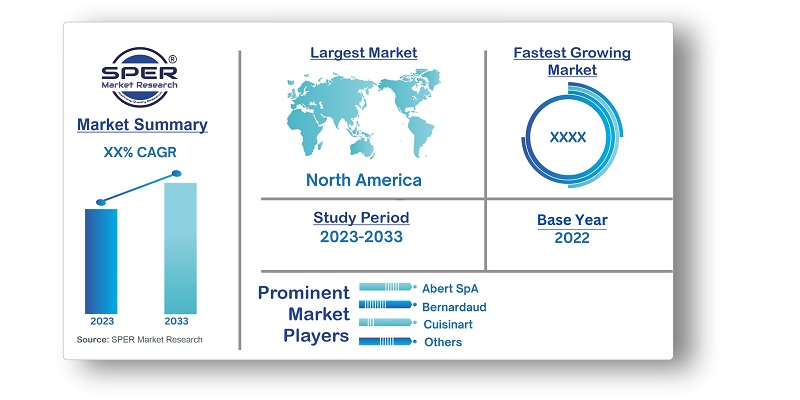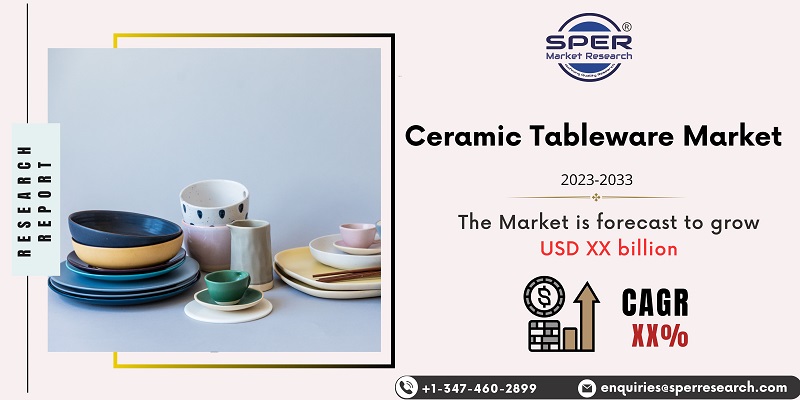
Ceramic Tableware Market Growth, Size, Trends, Demand, Revenue, Share and Future Competition
Ceramic Tableware Market Size- By Product Type, By Technology, By Distribution Channel, By End Use, By Pricing- Regional Outlook, Competitive Strategies and Segment Forecast to 2033
| Published: Nov-2023 | Report ID: FMCG23127 | Pages: 1 - 244 | Formats*: |
| Category : Consumer & Retail | |||
- 2022: Hollo wick, Inc., a food warming and table lighting company based in the United States, has been acquired by Steelite International plc.
- 2021: Lenox Corporation purchased Oneida Consumer LLC. The deal includes all existing Oneida consumer-branded tabletop goods, such as tableware, cutlery and cutlery. With this acquisition, Lenox has expanded its brand portfolio while focusing on increasing awareness across all retail channels. With a diversified product portfolio, the company intends to reach out to existing and new clientele while also strengthening its global distribution channels.


| Report Metric | Details |
| Market size available for years | 2019-2033 |
| Base year considered | 2022 |
| Forecast period | 2023-2033 |
| Segments covered | By Product Type, By Technology, By Distribution Channel, By End Use, By Pricing |
| Regions covered | North America, Asia-Pacific, Latin America, Middle East & Africa and Europe |
| Companies Covered | Abert SpA, Bernardaud, Cuisinart, Degrenne, Fiskars Group, Guangdong Songfa Ceramics, Lenox Corporation, Libbey Inc., Meyer Corporation Group, Mikasa, Noritake, Portmeirion Group PLC, Others. |
- Households
- Gift Shoppers
- Couples and Newlyweds
- Restaurants
- Interior Designers
| By Product Type: |
|
| By Technology: |
|
| By Distribution Channel: |
|
| By End Use: |
|
| By Pricing: |
|
- Global Ceramic Tableware Market Size (FY’2023-FY’2033)
- Overview of Global Ceramic Tableware Market
- Segmentation of Global Ceramic Tableware Market By Product Type (Dinner Ware, Drink Ware, Cook Ware, Others)
- Segmentation of Global Ceramic Tableware Market By Technology (Slip Casting, Spagless, Jiggering, Pressure Casting, Isostatic Casting, Others)
- Segmentation of Global Ceramic Tableware Market By Distribution Channel (Offline, Online)
- Segmentation of Global Ceramic Tableware Market By End Use (Residential, Commercial)
- Segmentation of Global Ceramic Tableware Market By Pricing (Low, Medium, High)
- Statistical Snap of Global Ceramic Tableware Market
- Expansion Analysis of Global Ceramic Tableware Market
- Problems and Obstacles in Global Ceramic Tableware Market
- Competitive Landscape in the Global Ceramic Tableware Market
- Impact of COVID-19 and Demonetization on Global Ceramic Tableware Market
- Details on Current Investment in Global Ceramic Tableware Market
- Competitive Analysis of Global Ceramic Tableware Market
- Prominent Players in the Global Ceramic Tableware Market
- SWOT Analysis of Global Ceramic Tableware Market
- Global Ceramic Tableware Market Future Outlook and Projections (FY’2023-FY’2033)
- Recommendations from Analyst
1.1. Scope of the report1.2. Market segment analysis
2.1. Research data source2.1.1. Secondary Data2.1.2. Primary Data2.1.3. SPER’s internal database2.1.4. Premium insight from KOL’s2.2. Market size estimation2.2.1. Top-down and Bottom-up approach2.3. Data triangulation
4.1. Driver, Restraint, Opportunity and Challenges analysis4.1.1. Drivers4.1.2. Restraints4.1.3. Opportunities4.1.4. Challenges4.2. COVID-19 Impacts of the Global Ceramic Tableware Market
5.1. SWOT Analysis5.1.1. Strengths5.1.2. Weaknesses5.1.3. Opportunities5.1.4. Threats5.2. PESTEL Analysis5.2.1. Political Landscape5.2.2. Economic Landscape5.2.3. Social Landscape5.2.4. Technological Landscape5.2.5. Environmental Landscape5.2.6. Legal Landscape5.3. PORTER’s Five Forces5.3.1. Bargaining power of suppliers5.3.2. Bargaining power of buyers5.3.3. Threat of Substitute5.3.4. Threat of new entrant5.3.5. Competitive rivalry5.4. Heat Map Analysis
6.1. Global Ceramic Tableware Market Manufacturing Base Distribution, Sales Area, Product Type6.2. Mergers & Acquisitions, Partnerships, Product Launch, and Collaboration in Global Ceramic Tableware Market
7.1. Global Ceramic Tableware Market Value Share and Forecast, By Product Type, 2023-20337.2. Cook Ware7.3. Dinner Ware7.4. Drink Ware7.5. Others
8.1. Global Ceramic Tableware Market Value Share and Forecast, By Technology, 2023-20338.2. Isostatic Casting8.3. Jiggering8.4. Pressure Casting8.5. Slip Casting8.6. Spagless8.7. Others
9.1. Global Ceramic Tableware Market Value Share and Forecast, By Distribution Channel, 2023-20339.2. Offline9.2.1. Supermarket/Hypermarket9.2.2. Speciality Stores9.2.3. Others9.3. Online9.3.1. Company Owned Websites9.3.2. E-Commerce Websites
10.1. Global Ceramic Tableware Market Value Share and Forecast, By End Use, 2023-203310.2. Commercial10.2.1. Café10.2.2. Bars10.2.3. Bistro10.2.4. Resorts10.2.5. others10.3. Residential
11.1. Global Ceramic Tableware Market Value Share and Forecast, By Pricing, 2023-203311.2. Low11.3. Medium11.4. High
12.1. Global Ceramic Tableware Market Size and Market Share
13.1. Global Ceramic Tableware Market Size and Market Share By Product Type (2019-2026)13.2. Global Ceramic Tableware Market Size and Market Share By Product Type (2027-2033)
14.1. Global Ceramic Tableware Market Size and Market Share By Technology (2019-2026)14.2. Global Ceramic Tableware Market Size and Market Share By Technology (2027-2033)
15.1. Global Ceramic Tableware Market Size and Market Share By Distribution Channel, (2019-2026)15.2. Global Ceramic Tableware Market Size and Market Share By Distribution Channel, (2027-2033)
16.1. Global Ceramic Tableware Market Size and Market Share By End Use, (2019-2026)16.2. Global Ceramic Tableware Market Size and Market Share By End Use, (2027-2033)
17.1. Global Ceramic Tableware Market Size and Market Share By Pricing, (2019-2026)17.2. Global Ceramic Tableware Market Size and Market Share By Pricing, (2027-2033)
18.1. Global Ceramic Tableware Market Size and Market Share By Region (2019-2026)18.2. Global Ceramic Tableware Market Size and Market Share By Region (2027-2033)18.3. Asia-Pacific18.3.1. Australia18.3.2. China18.3.3. India18.3.4. Japan18.3.5. South Korea18.3.6. Rest of Asia-Pacific18.4. Europe18.4.1. France18.4.2. Germany18.4.3. Italy18.4.4. Spain18.4.5. United Kingdom18.4.6. Rest of Europe18.5. Middle East and Africa18.5.1. Kingdom of Saudi Arabia18.5.2. United Arab Emirates18.5.3. Rest of Middle East & Africa18.6. North America18.6.1. Canada18.6.2. Mexico18.6.3. United States18.7. Latin America18.7.1. Argentina18.7.2. Brazil18.7.3. Rest of Latin America
19.1. Abert SpA19.1.1. Company details19.1.2. Financial outlook19.1.3. Product summary19.1.4. Recent developments19.2. Bernardaud
19.2.1. Company details
19.2.2. Financial outlook19.2.3. Product summary19.2.4. Recent developments19.3. Cuisinart19.3.1. Company details19.3.2. Financial outlook19.3.3. Product summary19.3.4. Recent developments19.4. Degrenne19.4.1. Company details19.4.2. Financial outlook19.4.3. Product summary19.4.4. Recent developments19.5. Fiskars Group19.5.1. Company details19.5.2. Financial outlook19.5.3. Product summary19.5.4. Recent developments19.6. Guangdong Songfa Ceramics19.6.1. Company details19.6.2. Financial outlook19.6.3. Product summary19.6.4. Recent development19.7. Lenox Corporation19.7.1. Company details19.7.2. Financial outlook19.7.3. Product summary19.7.4. Recent developments19.8. Libbey Inc.19.8.1. Company details19.8.2. Financial outlook19.8.3. Product summary19.8.4. Recent developments19.9. Meyer Corporation Group19.9.1. Company details19.9.2. Financial outlook19.9.3. Product summary19.9.4. Recent developments19.10. Mikasa19.10.1. Company details19.10.2. Financial outlook19.10.3. Product summary19.10.4. Recent developments19.11. Noritake19.11.1. Company details19.11.2. Financial outlook19.11.3. Product summary19.11.4. Recent developments19.12. Portmeirion Group PLC19.12.1. Company details19.12.2. Financial outlook19.12.3. Product summary19.12.4. Recent developments19.13. Others
SPER Market Research’s methodology uses great emphasis on primary research to ensure that the market intelligence insights are up to date, reliable and accurate. Primary interviews are done with players involved in each phase of a supply chain to analyze the market forecasting. The secondary research method is used to help you fully understand how the future markets and the spending patterns look likes.
The report is based on in-depth qualitative and quantitative analysis of the Product Market. The quantitative analysis involves the application of various projection and sampling techniques. The qualitative analysis involves primary interviews, surveys, and vendor briefings. The data gathered as a result of these processes are validated through experts opinion. Our research methodology entails an ideal mixture of primary and secondary initiatives.



Frequently Asked Questions About This Report
PLACE AN ORDER
Year End Discount
Sample Report
Pre-Purchase Inquiry
NEED CUSTOMIZATION?
Request CustomizationCALL OR EMAIL US
100% Secure Payment






Related Reports
Our Global Clients
Our data-driven insights have influenced the strategy of 200+ reputed companies across the globe.




















